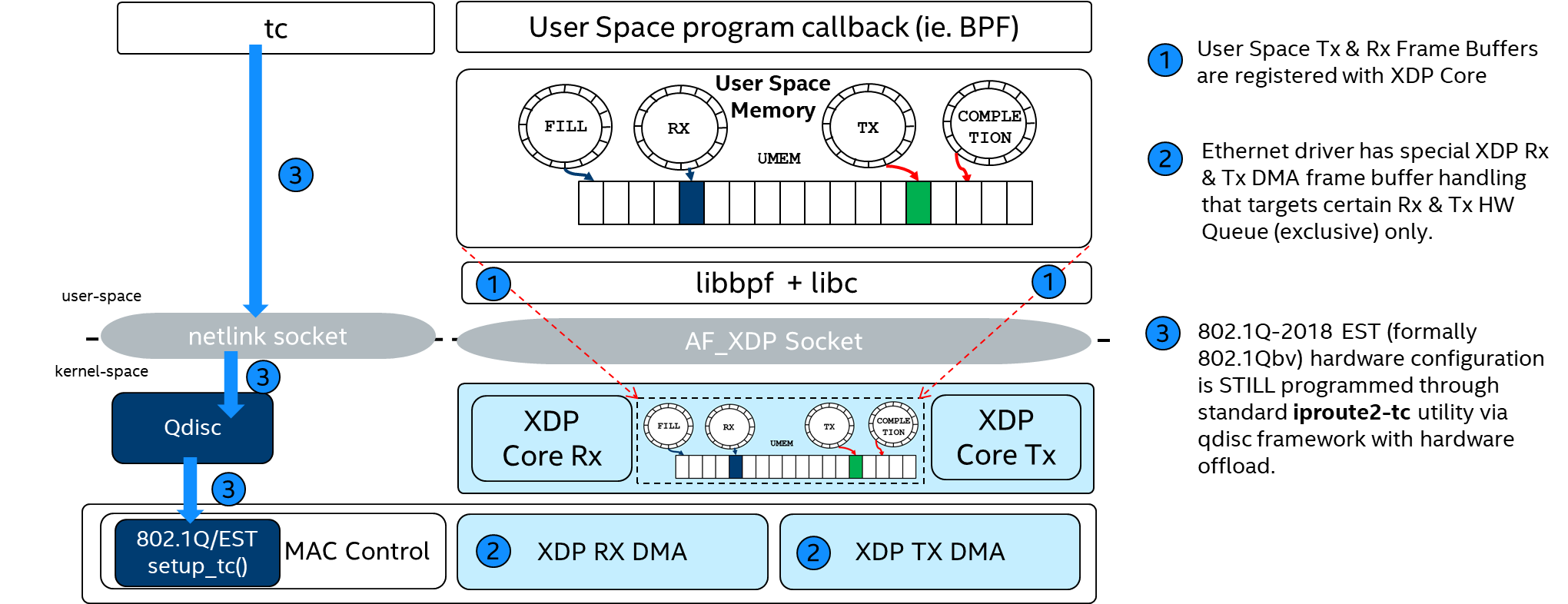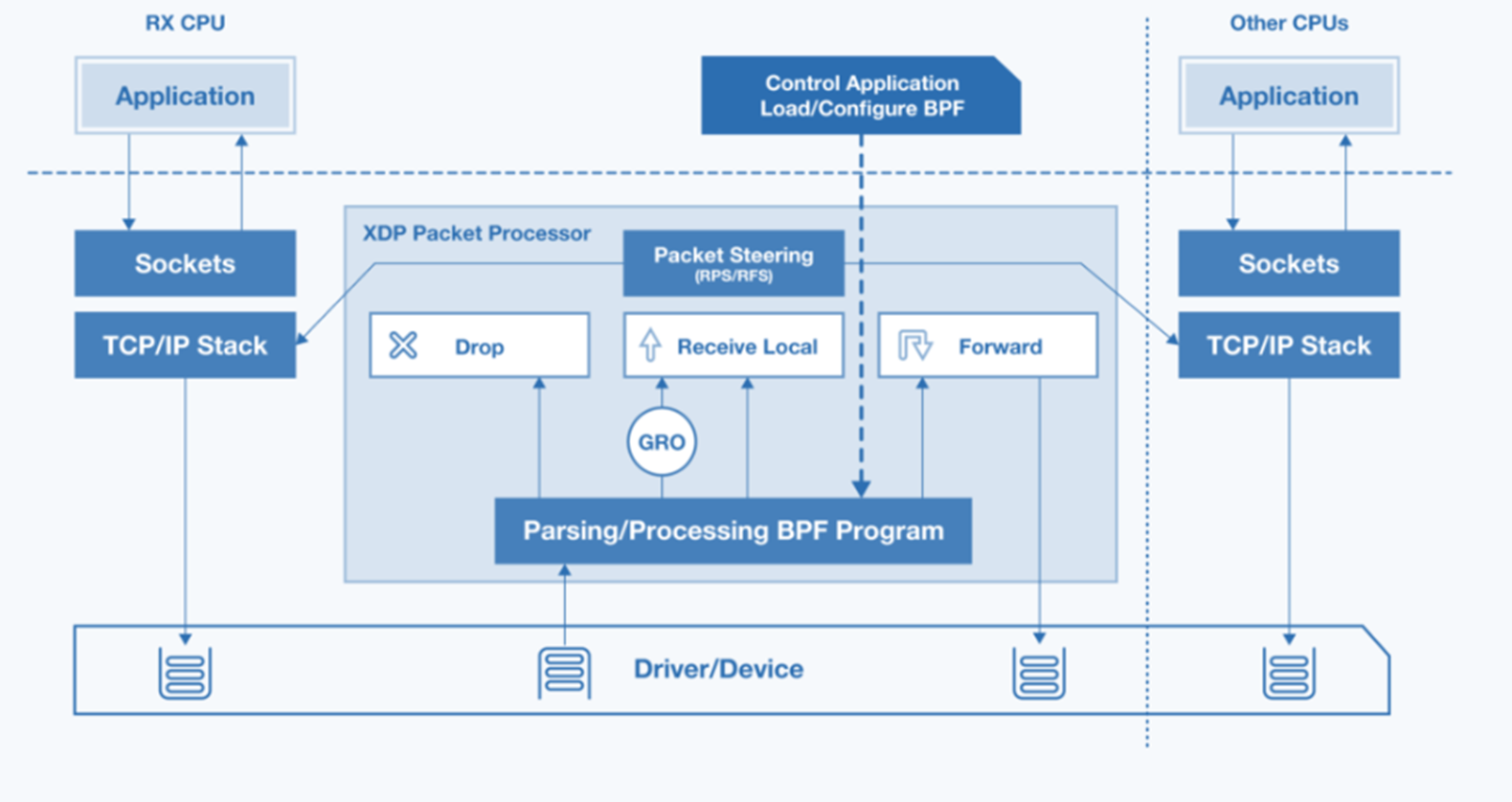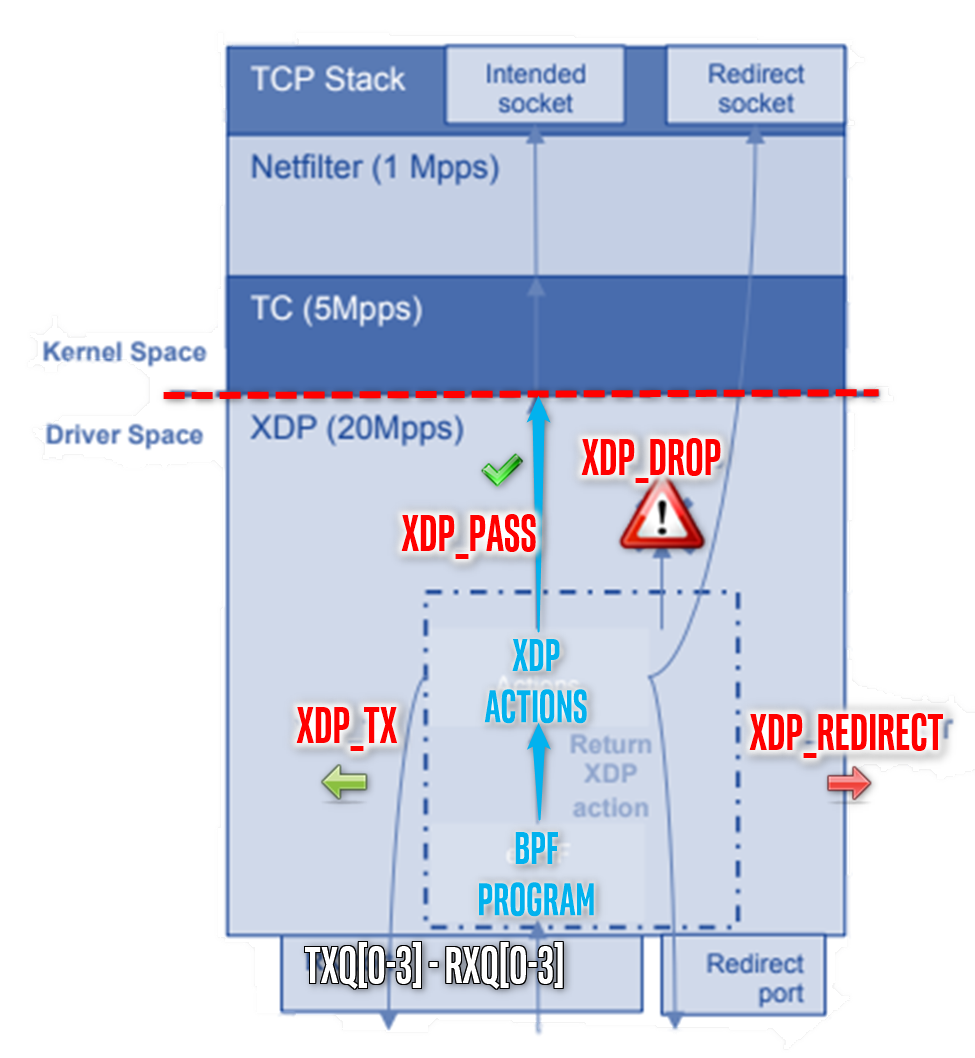eBPF Offload Native Mode XDP on Intel® Ethernet Linux Driver¶
Intel® ECI enables Linux eXpress Data Path (XDP) Native Mode (for example, XDP_FLAGS_DRV_MODE) on Intel® Ethernet Linux drivers across multiple industry-graded Ethernet Controllers:
[Ethernet PCI
8086:7aacand8086:7aad] 13th and 12th Gen Intel® Core™ S-Series [Raptor Lake and Alder Lake] Ethernet GbE Time-Sensitive Network Controller[Ethernet PCI
8086:a0ac] 11th Gen Intel® Core™ U-Series and P-Series [Tiger Lake] Ethernet GbE Time-Sensitive Network Controller[Ethernet PCI
8086:4b32and8086:4ba0] Intel® Atom® x6000 Series [Elkhart Lake] Ethernet GbE Time-Sensitive Network Controller[Ethernet PCI
8086:15f2] Intel® Ethernet Controller I225-LM for Time-Sensitive Networking (TSN)[Ethernet PCI
8086:125b] Intel® Ethernet Controller I226-LM for Time-Sensitive Networking (TSN)[Ethernet PCI
8086:157b,8086:1533,…] Intel® Ethernet Controller I210-IT for Time-Sensitive Networking (TSN)
Install Linux BPFTool¶
The following section is applicable to:

Make sure that the running Linux distribution kernel matches the necessary XDP and BPF configuration:
$ cat /boot/config-$(uname -r) | grep -e .*BPF.* -e .*XDP.*
or alternatively :
$ zcat /proc/config.gz | grep -e .*BPF.* -e .*XDP.*
CONFIG_CGROUP_BPF=y CONFIG_BPF=y # CONFIG_BPF_LSM is not set CONFIG_BPF_SYSCALL=y CONFIG_ARCH_WANT_DEFAULT_BPF_JIT=y # CONFIG_BPF_JIT_ALWAYS_ON is not set CONFIG_BPF_JIT_DEFAULT_ON=y # CONFIG_BPF_UNPRIV_DEFAULT_OFF is not set # CONFIG_BPF_PRELOAD is not set CONFIG_XDP_SOCKETS=y # CONFIG_XDP_SOCKETS_DIAG is not set CONFIG_IPV6_SEG6_BPF=y # CONFIG_NETFILTER_XT_MATCH_BPF is not set # CONFIG_BPFILTER is not set CONFIG_NET_CLS_BPF=m CONFIG_NET_ACT_BPF=m CONFIG_BPF_JIT=y # CONFIG_BPF_STREAM_PARSER is not set CONFIG_LWTUNNEL_BPF=y CONFIG_HAVE_EBPF_JIT=y CONFIG_BPF_EVENTS=y # CONFIG_BPF_KPROBE_OVERRIDE is not set # CONFIG_TEST_BPF is not set
Install
bpftool, provided by ECI, corresponding to the exact Linux Intel® tree or from the Linux distribution mainlinebpftool/stable:


Install from individual Deb package
$ sudo apt search bpftoolFor example, an Debian distribution set up with ECI repository will list the following:
Sorting... Done Full Text Search... Done bpftool/stable 7.1.0+6.1.76-1 amd64 Inspection and simple manipulation of BPF programs and maps bpftool-6.1/unknown,now 6.1.59-rt16-r0-0eci1 amd64 [installed] Inspection and simple manipulation of BPF programs and mapsNote: Intel® ECI ensures that Linux XDP support always matches the Linux Intel® LTS branches (for example, no delta between
kernel/bpfandtools/bpf).Install the
bpftoolfor Debian 12 (Bookworm):$ sudo apt install bpftool-6.1Install the
bpftoolfor Canonical® Ubuntu® 22.04 (Jammy Jellyfish):$ sudo apt install bpftool-5.15

Install from individual RPM package
$ sudo apt install bpftool
Install Linux XDP Tools¶
The following section is applicable to:

Make sure both kernel and bpftool supports XDP :
Install
bpftool, provided by ECI, corresponding to the exact Linux Intel® tree or from the Linux distribution mainlinebpftool/stable:


Install from individual Deb package
Install the
xdp-toolsfor Debian 12 (Bookworm):$ sudo apt install xdp-toolsNote: Intel® ECI ensures XDP tools is made available on Canonical® Ubuntu® 22.04 (Jammy Jellyfish)
$ sudo apt search xdp-toolsFor example, an Debian distribution set up with ECI repository will list the following:
Sorting... Done Full Text Search... Done xdp-tools/unknown,unknown,now 1.2.9-1~bpo11+1 amd64 [installed,automatic] library and utilities for use with XDP

Install from individual RPM package
$ sudo apt install xdp-tools
Usage
The Linux xdp-project community xdpdump program provides a stable reference to understand and experiment with network packet processing using BPF program with XDP APIs.
$ xdpdump -hUsage: xdpdump [options] XDPDump tool to dump network traffic Options: --rx-capture <mode> Capture point for the rx direction (valid values: entry,exit) -D, --list-interfaces Print the list of available interfaces --load-xdp-mode <mode> Mode used for --load-xdp-mode, default native (valid values: native,skb,hw,unspecified) --load-xdp-program Load XDP trace program if no XDP program is loaded -i, --interface <ifname> Name of interface to capture on --perf-wakeup <events> Wake up xdpdump every <events> packets -p, --program-names <prog> Specific program to attach to -P, --promiscuous-mode Open interface in promiscuous mode -s, --snapshot-length <snaplen> Minimum bytes of packet to capture --use-pcap Use legacy pcap format for XDP traces -w, --write <file> Write raw packets to pcap file -x, --hex Print the full packet in hex -v, --verbose Enable verbose logging (-vv: more verbose) --version Display version information -h, --help Show this help
Note: every Loading and Unloading program in Linux eXpress Data Path (XDP) Native Mode flushes Intel® Ethernet Linux Ethernet Controllers TX-RX hw-queues.
Sanity Check #1: Load and Execute eBPF Offload Program with “Generic mode” XDP¶
Install both
xdpdumpand iPerf - The ultimate speed test tool for TCP, UDP and SCTP:


- Install from individual Deb package
$ sudo apt install xdp-tools iperf3

Install from individual RPM package
$ sudo dnf install xdp-tools iperf3
Generate UDP traffic between talker and listener:
Set a L4-level UDP Listener on Ethernet device
enp1s0with IPv4, for example set to 192.168.1.206:$ ip addr add 192.168.1.206/24 brd 192.168.0.255 dev enp1s0 $ iperf3 -s
----------------------------------------------------------- Server listening on 5201 -----------------------------------------------------------
Set a L4-level UDP Talker with 1448 bytes payload size on another node Ethernet device
enp1s0with a different IPv4 address, for example set to 192.168.1.203:$ ip addr add 192.168.1.203/24 brd 192.168.0.255 dev enp1s0 $ iperf3 -c 192.168.1.206 -t 600 -b 0 -u -l 1448
Connecting to host 192.168.1.206, port 5201 [ 5] local 192.168.1.203 port 36974 connected to 192.168.1.206 port 5201 [ ID] Interval Transfer Bitrate Total Datagrams [ 5] 0.00-1.00 sec 114 MBytes 957 Mbits/sec 82590 [ 5] 1.00-2.00 sec 114 MBytes 956 Mbits/sec 82540
Execute the precompiled BPF XDP program loaded on the device in “Generic mode” XDP (for example,
XDP_FLAGS_SKB_MODE) with successfulXDP_PASSandXDP_DROPactions:$ xdpdump -i enp1s0 --load-xdp-mode skb
Current rlimit 8388608 already >= minimum 1048576 WARNING: Specified interface does not have an XDP program loaded, capturing in legacy mode! listening on enp1s0, link-type EN10MB (Ethernet), capture size 262144 bytes 1712162549.137596: packet size 68 bytes on if_name "enp1s0" 1712162550.137605: packet size 68 bytes on if_name "enp1s0" 1712162551.137612: packet size 68 bytes on if_name "enp1s0"
Press Ctrl + C to unload the XDP program:
^C 3 packets captured 0 packets dropped by kernel
Sanity Check #2: Load and Execute eBPF Offload program with “Native mode” XDP¶
Generate UDP traffic between talker and listener similar to sanity check #1.
Execute the precompiled BPF XDP program loaded on the device in “Native mode” XDP with successful
XDP_PASSandXDP_DROPactions:$ xdpdump -i enp1s0 --load-xdp-mode native
Current rlimit 8388608 already >= minimum 1048576 WARNING: Specified interface does not have an XDP program loaded, capturing in legacy mode! listening on enp1s0, link-type EN10MB (Ethernet), capture size 262144 bytes 1712162563.137741: packet size 68 bytes on if_name "enp1s0" 1712162564.137746: packet size 68 bytes on if_name "enp1s0" 1712162565.137762: packet size 68 bytes on if_name "enp1s0"
Press Ctrl + C to the unload XDP program:
^C 3 packets captured 0 packets dropped by kernel
Linux eXpress Data Path (XDP)¶
The Intel® Linux Ethernet drivers’ Native node XDP offers a standardized Linux API to achieve low-overhead Ethernet Layer2 packet-processing (encoding, decoding, filtering, and so on) on industrial protocols like UADP ETH, ETherCAT, or Profinet-RT/IRT, without any prior knowledge of Intel® Ethernet Controller architecture.
Intel® ECI can leverage the Native mode XDP across Linux eBPF program offload XDP ** and Traffic Control (TC) **BPF Classifier (cls_bpf) in industrial networking usage models.
Linux QDisc AF_PACKET socket presents performance limitation. The following table compares both design approaches.
AF_PACKETS Socket with QDisc
AF_XDP Socket/eBPF Offload
Linux Network Stack (TCP/IP, UDP/IP)
Yes
BPF runtime program/library
idg_xdp_ringdirect DMAOSI Layer L4 (Protocol)-L7 (Application)
Yes
No
Number of net packets copied across kernel to users
Several skb_data
memcpyNone in UMEM/Zero-copy mode A few in UMEM/copy mode
IEEE 802.1Q-2018 Enhancements for Scheduled Traffic (EST) Frame Preemption (FPE)
Standardize API for Hardware offload
Customize Hardware offload
Deterministic Ethernet Network Cycle-Time requirement
Moderate
Tight
Per-Packets RX-OFFLOAD timestamp
Yes
Yes
Per-Packets TX-OFFLOAD launch-time (TBS)
Yes, AF_PACKETS SO_TXTIME cmsg
No
IEEE 802.1AS L2/PTP RX and TX hardware offload
Yes L2/PTP
Yes L2/PTP
Intel® Ethernet Controllers Linux drivers can handle the most commonly used XDP actions, allowing Ethernet L2-level packets traversing networking stack to be reflected, filtered, or redirected with lowest-latency overhead (for example, DMA accelerated transfer with limited memcpy, XDP_COPY or without any XDP_ZEROCOPY):
eBPF programs classify/modify traffic and return XDP actions:
XDP_PASS
XDP_DROP
XDP_TX
XDP_REDIRECT
XDP_ABORTNote:
cls_bpfin Linux Traffic Control (TC) works in same manner as the kernel Space.
The following table summarizes the eBPF offload Native mode XDP support available on the Intel® Linux Ethernet controllers.
eBPF Offload
v5.1x.y/v6.1.y APIs
Intel® I210/igb.ko
Intel® GbE/stmmac.ko
Intel® I22x-LM/igc.ko
XDP program features
XDP_DROPYes
Yes
Yes
XDP_PASSYes
Yes
Yes
XDP_TX8Yes
Yes
Yes
XDP_REDIRECTYes
Yes
Yes
XDP_ABORTEDYes
Yes
Yes
Packet read access
Yes
Yes
Yes
Conditional statements
Yes
Yes
Yes
xdp_adjust_head()Yes
Yes
Yes
bpf_get_prandom_u32()Yes
Yes
Yes
perf_event_output()Yes
Yes
Yes
Partial offload
Yes
Yes
Yes
RSS
rx_queue_indexselectYes
Yes
Yes
bpf_adjust_tail()
Yes
Yes
Yes
XDP maps features
Offload ownership for maps
Yes
Yes
Yes
Hash maps
Yes
Yes
Yes
Array maps
Yes
Yes
Yes
bpf_map_lookup_elem()Yes
Yes
Yes
bpf_map_update_elem()Yes
Yes
Yes
bpf_map_delete_elem()Yes
Yes
Yes
Atomic
sync_fetch_and_adduntested
untested
untested
Map sharing between ports
untested
untested
untested
uarch optimization features
Localized packet cache
untested
untested
untested
32 bit BPF support
untested
untested
untested
Localized maps
untested
untested
untested
AF_XDP Socket (CONFIG_XDP_SOCKETS)¶
An AF_XDP socket (XSK) is created with the normal socket() system call. Two rings are associated with each XSK: the RX ring and the TX ring. A socket can receive packets on the RX ring and it can send packets on the TX ring. These rings are registered and sized with the setsockopts - XDP_RX_RING and XDP_TX_RING, respectively. It is mandatory to have at least one of these rings for each socket. An RX or TX descriptor ring points to a data buffer in a memory area called a UMEM. RX and TX can share the same UMEM so that a packet does not have to be copied between RX and TX. Moreover, if a packet needs to be kept for a while due to a possible retransmit, the descriptor that points to that packet can be changed to point to another and reused right away. This avoids copying of data.

Kernel feature CONFIG_XDP_SOCKETS allows the Linux drivers igb.ko, igc.ko, and stmmac-pci.ko to offload to the eBPF program XDP for transferring the packets up to the user space using AF_XDP.
You can install all officially supported Linux BPF samples eBPF sample programs as Deb packages from the ECI repository.
The following section is applicable to:

Setup the ECI repository, then perform either of the following commands to install this component:


Install from individual Deb package
For example, on Debian 12 (Bookworm), run the following command to install the
linux-bpf-samplespackage:$ sudo apt install xdpsock bpftool-6.1Alternatively on Canonical® Ubuntu® 22.04 (Jammy Jellyfish), run the following command to install the
linux-bpf-samplespackage:$ sudo apt install xdpsock bpftool-5.15Note: From Linux v5.15 onward, the
vmlinux.hgenerated header (CONFIG_DEBUG_INFO_BTF=y) is recommended for the BPF program to improve portability whenlibbpfenables Compile once, run everywhere (CO:RE)”. It contains all type definitions that Linux Intel® 2021/lts running Linux kernel uses in its own source code.$ bpftool btf dump file /sys/kernel/btf/vmlinux format c > /tmp/vmlinux.h

Install from individual RPM package
This package is not yet available for Red Hat® Enterprise Linux®.

Usage
The Linux xdp-project community xdpsock program provides a stable reference to understand and experiment with the AF_XDP socket API.
$ /opt/xdp/bpf-examples/af-xdp/xdpsock -hUsage: xdpsock [OPTIONS] Options: -r, --rxdrop Discard all incoming packets (default) -t, --txonly Only send packets -l, --l2fwd MAC swap L2 forwarding -i, --interface=n Run on interface n -q, --queue=n Use queue n (default 0) -p, --poll Use poll syscall -S, --xdp-skb=n Use XDP skb-mod -N, --xdp-native=n Enforce XDP native mode -n, --interval=n Specify statistics update interval (default 1 sec). -O, --retries=n Specify time-out retries (1s interval) attempt (default 3). -z, --zero-copy Force zero-copy mode. -c, --copy Force copy mode. -m, --no-need-wakeup Turn off use of driver need wakeup flag. -f, --frame-size=n Set the frame size (must be a power of two in aligned mode, default is 4096). -u, --unaligned Enable unaligned chunk placement -M, --shared-umem Enable XDP_SHARED_UMEM (cannot be used with -R) -d, --duration=n Duration in secs to run command. Default: forever. -w, --clock=CLOCK Clock NAME (default MONOTONIC). -b, --batch-size=n Batch size for sending or receiving packets. Default: 64 -C, --tx-pkt-count=n Number of packets to send. Default: Continuous packets. -s, --tx-pkt-size=n Transmit packet size. (Default: 64 bytes) Min size: 64, Max size 4096. -P, --tx-pkt-pattern=nPacket fill pattern. Default: 0x12345678 -V, --tx-vlan Send VLAN tagged packets (For -t|--txonly) -J, --tx-vlan-id=n Tx VLAN ID [1-4095]. Default: 1 (For -V|--tx-vlan) -K, --tx-vlan-pri=n Tx VLAN Priority [0-7]. Default: 0 (For -V|--tx-vlan) -G, --tx-dmac=<MAC> Dest MAC addr of TX frame in aa:bb:cc:dd:ee:ff format (For -V|--tx-vlan) -H, --tx-smac=<MAC> Src MAC addr of TX frame in aa:bb:cc:dd:ee:ff format (For -V|--tx-vlan) -T, --tx-cycle=n Tx cycle time in micro-seconds (For -t|--txonly). -y, --tstamp Add time-stamp to packet (For -t|--txonly). -W, --policy=POLICY Schedule policy. Default: SCHED_OTHER -U, --schpri=n Schedule priority. Default: 0 -x, --extra-stats Display extra statistics. -Q, --quiet Do not display any stats. -a, --app-stats Display application (syscall) statistics. -I, --irq-string Display driver interrupt statistics for interface associated with irq-string. -B, --busy-poll Busy poll. -R, --reduce-cap Use reduced capabilities (cannot be used with -M)
Note: every Loading and Unloading program in Linux eXpress Data Path (XDP) Native Mode flushes Intel® Ethernet Linux Ethernet Controllers TX-RX hw-queues.
Sanity Check #3: Load and Execute “Native mode” AF_XDP Socket Default XDP_COPY¶
Set up two or more ECI nodes according to the AF_XDP Socket (CONFIG_XDP_SOCKETS) guidelines.
Execute a
XDP_RXaction from the precompiled BPF XDP program loaded usingigc.koorigb.koandstmmac.koIntel® Ethernet Controller Linux interface under Native mode with default XDP_COPY:xdpsock -i enp0s30f4 -q 0 -N -c
sock0@enp0s30f4:0 rxdrop xdp-drv pps pkts 1.01 rx 0 0 tx 0 0 sock0@enp0s30f4:0 rxdrop xdp-drv pps pkts 1.00 rx 0 0 tx 0 0 sock0@enp0s30f4:0 rxdrop xdp-drv pps pkts 1.00 rx 0 0 tx 0 0 sock0@enp0s30f4:0 rxdrop xdp-drv pps pkts 1.00 rx 0 0 tx 0 0 ^C sock0@enp0s30f4:0 rxdrop xdp-drv pps pkts 0.47 rx 0 0 tx 0 0
Display the eBPF program actively exposing the
AF_XDPsocket:$ bpftool prog show
... 29: xdp tag 992d9ddc835e5629 loaded_at 2020-03-13T16:14:38+0000 uid 0 xlated 176B not jited memlock 4096B map_ids 1
Display the active
xsk_mapkernel memory space allocated by the eBPF program:$ bpftool map
1: xskmap name xsks_map flags 0x0 key 4B value 4B max_entries 6 memlock 4096B
Press Ctrl + C to unmount AF_XDP socket and unload eBPF program
Sanity Check #4: Load and Execute “Native mode” AF_XDP Socket Default XDP_ZEROCOPY¶
Set up two or more ECI nodes according to the AF_XDP Socket (CONFIG_XDP_SOCKETS) guidelines.
Execute a
XDP_RXaction from the precompiled BPF XDP program loaded usingigc.koorigb.koandstmmac.koIntel® Ethernet Controller Linux interface under Native mode withXDP_ZEROCOPYenabled:$ xdpsock -i enp0s30f4 -q 0 -N -z
sock0@enp0s30f4:0 rxdrop xdp-drv pps pkts 1.01 rx 0 0 tx 0 0 sock0@enp0s30f4:0 rxdrop xdp-drv pps pkts 1.00 rx 0 0 tx 0 0 sock0@enp0s30f4:0 rxdrop xdp-drv pps pkts 1.00 rx 0 0 tx 0 0 sock0@enp0s30f4:0 rxdrop xdp-drv pps pkts 1.00 rx 0 0 tx 0 0 ^C sock0@enp0s30f4:0 rxdrop xdp-drv pps pkts 0.47 rx 0 0 tx 0 0
Display the eBPF program actively exposing the
AF_XDPsocket:$ bpftool prog show
30: xdp tag 992d9ddc835e5629 loaded_at 2020-03-13T16:04:37+0000 uid 0 xlated 176B not jited memlock 4096B map_ids 2
Display the active
xsk_mapkernel memory space allocated by the eBPF program:$ bpftool map
2: xskmap name xsks_map flags 0x0 key 4B value 4B max_entries 6 memlock 4096B
Press Ctrl + C to unmount the
AF_XDPsocket and unload eBPF program.
BPF Compiler Collection (BCC)¶
BPF Compiler Collection (BCC) makes it easy to build and load BPF programs into the kernel directly from Python code. This can be used for XDP packet processing. For more details, refer to the BCC web site.
By using BCC from a container in ECI, you can develop and test BPF programs attached to TSN NICs directly on the target without the need for a separate build system.
The following BCC XDP Redirect example is derived from the kernel self test. It creates two namespaces with two veth peers, and forwards packets in-between using generic XDP.
The following section is applicable to:

Create the
vethdevices and their peers in their respective namespaces:$ ip netns add ns1 $ ip netns add ns2 $ ip link add veth1 index 111 type veth peer name veth11 netns ns1 $ ip link add veth2 index 222 type veth peer name veth22 netns ns2 $ ip link set veth1 up $ ip link set veth2 up $ ip -n ns1 link set dev veth11 up $ ip -n ns2 link set dev veth22 up $ ip -n ns1 addr add 10.1.1.11/24 dev veth11 $ ip -n ns2 addr add 10.1.1.22/24 dev veth22
Make sure that pinging from the
vethpeer in one namespace to the othervethpeer in another namespace does not work in any direction without XDP redirect:$ ip netns exec ns1 ping -c 1 10.1.1.22 PING 10.1.1.22 (10.1.1.22): 56 data bytes --- 10.1.1.22 ping statistics --- 1 packets transmitted, 0 packets received, 100% packet loss
$ ip netns exec ns2 ping -c 1 10.1.1.11 PING 10.1.1.11 (10.1.1.11): 56 data bytes --- 10.1.1.11 ping statistics --- 1 packets transmitted, 0 packets received, 100% packet loss
In another terminal, run the BCC container:
$ docker run -it --rm \ --name bcc \ --privileged \ --net=host \ -v /lib/modules/$(uname -r)/build:/lib/modules/host-build:ro \ bcc
Inside the container, create a new file
xdp_redirect.pywith the following content:#!/usr/bin/python from bcc import BPF import time import sys b = BPF(text = """ #include <uapi/linux/bpf.h> int xdp_redirect_to_111(struct xdp_md *xdp) { return bpf_redirect(111, 0); } int xdp_redirect_to_222(struct xdp_md *xdp) { return bpf_redirect(222, 0); } """, cflags=["-w"]) flags = (1 << 1) # XDP_FLAGS_SKB_MODE #flags = (1 << 2) # XDP_FLAGS_DRV_MODE b.attach_xdp("veth1", b.load_func("xdp_redirect_to_222", BPF.XDP), flags) b.attach_xdp("veth2", b.load_func("xdp_redirect_to_111", BPF.XDP), flags) print("BPF programs loaded and redirecting packets, hit CTRL+C to stop") while 1: try: time.sleep(1) except KeyboardInterrupt: print("Removing BPF programs") break; b.remove_xdp("veth1", flags) b.remove_xdp("veth2", flags)
Run
xdp_redirect.pyto load eBPF program :$ python3 xdp_redirect.py BPF programs loaded and redirecting packets, hit CTRL+C to stop
In the first terminal, make sure that pinging from the
vethpeer in one namespace$ ip netns exec ns1 ping -c 1 10.1.1.22
PING 10.1.1.22 (10.1.1.22): 56 data bytes 64 bytes from 10.1.1.22: seq=0 ttl=64 time=0.067 ms --- 10.1.1.22 ping statistics --- 1 packets transmitted, 1 packets received, 0% packet loss round-trip min/avg/max = 0.067/0.067/0.067 ms
In the second terminal,
vethpeer in another namespace works in both directions due to XDP redirect:$ ip netns exec ns2 ping -c 1 10.1.1.11
PING 10.1.1.11 (10.1.1.11): 56 data bytes 64 bytes from 10.1.1.11: seq=0 ttl=64 time=0.044 ms --- 10.1.1.11 ping statistics --- 1 packets transmitted, 1 packets received, 0% packet loss round-trip min/avg/max = 0.044/0.044/0.044 ms

